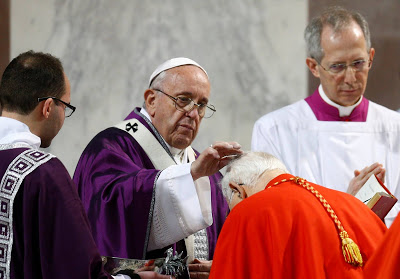 Worship is not Theatre
Worship is not Theatre
Today, if Air Asia claims that everyone can fly, social media has made it possible for just anyone to be a celebrity. Every mundane thought, feeling, moment or action is posted somewhere on social media to make sure others know what we’ve done, seen, experienced or felt today. It’s as if we try really hard to receive validation and appreciation: we need people to see we are doing good things, we need a certain number of ‘likes’ and ‘comments’ for our actions to be of value. I often see - when I'm on Facebook - videos or photos of people giving to the poor, or helping someone out: people record themselves doing these things and then share them online for the world to see. Today, for example, we’re going to witness loads of Instagram foodie shots exhibiting that miserable slice of bread or bowl of soup that constitutes our fasting diet. If not for the recent pastoral recommendation to prevent the spread of COVID-19, we would also see many photos of ash stained foreheads.
But our Lord warns us in today’s gospel, people who do this, “they have had their reward.” In other words, when we show our good deeds to the world, and receive validation from the world in this way, the only reward we will receive for that deed is of this world - it is of no eternal value. We can have our reward, votes, acclaim, temporary esteem but we cannot use it as “credit” to get to Heaven – because we have expended our entire reward in the here and now. When we act in this way, we do it not to please God, but rather we crave the praise of men.
It is interesting how our Lord uses the word “hypocrite” in today’s passage. For in ancient times, the word was more commonly heard in the theatre than in a temple. It was a word used to describe an actor on a stage. The Greek word, in referring to the actor, means “under the mask” or “mask-wearer”. The actor was play-acting, he was pretending. That is what hypocrites do. They pretend.
So when our Lord used this word to speak of those practising the traditional acts of piety, prayer, fasting and alms-giving, the word carried a weightier sting. What were these people pretending to be? They were pretending to be religious; holy; spiritual; they were pretending to be people who were serving God. The religious hypocrite has perfected the outward appearance, the ingratiating smile, the holier than thou accent, the long robes and so forth. With all the fanfare, pyrotechnics, and showmanship- God is totally unimpressed! They were pretending to be people who wanted to please God but God wasn’t pleased. Even today there are some people who desperately crave an audience for their spirituality. For these people if the show is not “on” then the performance is “off”. Their spirituality is wholly and solely for human consumption. Jesus says that ‘such people have had their reward’ – they crave fleeting human attention, human praise, human admiration, and that is all the reward they will ever get. They forget that if others are not able to see through their disguises, God can. He sees through every disguise and pretense. He alone knows who and what we truly are.
At first glance, this may seem opposed to our Lord’s earlier teaching, which we heard two Sundays ago, to be “salt of the earth,” “light of the world,” “a city built on a hill” and to let “your light shine before others” so that “they may see your good deeds.” There, our Lord commanded the disciples to live the beatitudes visibly in order to radiate God’s love to the world. When others see our good deeds, it is meant to give glory to God. In today’s passage, however, our Lord warns us not to do righteous deeds in order to draw attention to ourselves.
So, it must be clear that our Lord is not condemning the penitential acts of fasting, prayer and almsgiving. What is in question is the interior motivation and disposition for these acts. What must be avoided would be “hypocrisy”. These pious practices in themselves, however, are not evidence of hypocrisy. Hypocrisy is the split between outward show and inner reality, where actions do not correspond to one’s interior life. So, the words of Jesus are not to be interpreted as a disavowal of external actions but an invitation to match external actions with interior disposition. Our charitable acts must flow from a heart that is truly charitable and not only because we wish to earn the praises of others. Every act of penance must have an interior aspect, an inner change of heart, as well as an exterior aspect, changing one’s life in harmony with the change of heart. The interior aspect has to do with sorrow for sin, and with a firm resolve to amend one’s life, to conform ourselves more closely to Christ; the exterior aspect has to do with the self-denial, the good works, the sacrifices, which are necessary to overcome one’s selfish tendencies that lead to sin. In all matters, our actions must give glory to God. Our pious acts are not meant to “show off” our piety, but to “show forth” God’s love in the world.
What happens when our actions are meant to show off instead of glorifying God? Two Protestant Pastors in their best-selling book had this to say, “When ministry becomes performance, then the sanctuary becomes a theater, the congregation becomes an audience, worship becomes entertainment, and man’s applause and approval become the measure of success. But when ministry is for the glory of God, His presence moves into the sanctuary. Even the unsaved visitor will fall down on his face, worship God, and confess that God is among us.” (Warren and David Wiersbe, 10 Power Principles for Christian Service)
Three times Jesus uses the phrase: “And your Father who sees all that is done in secret will reward you.” And twice Jesus refers to ‘your Father who is in that secret place”. We are reminded that the God who sees acts hidden from human sight will surely reward our devotions given without fanfare. By leaving the question of reward to God, one is set free from the concerns of others. God is watching us and cannot be fooled. Spiritual performance is thus completely futile, and only humility, repentance and contrition will impress the Lord.
Prayer, fasting and almsgiving are good, and we should all continue to pray, fast and give alms but these pious actions are not performance, nor is it theatre and it is certainly not a way of winning public approval. Prayer, fasting and almsgiving are ways in which we seek to enter into a holy reverent communion with God, not theatrics, antics and showmanship. Therefore, we need to be on guard against the temptation to want to please man; or to congratulate ourselves; or to seek the wrong reward; to have the wrong motivation. The effort to lead a life of public piety should not make us self-congratulatory, self-justifying or judgmental of others. If this has happened, we know that we have fallen into the trap or the “quicksand” of hypocrisy.
For a supremely ironic twist to this central theme of the gospel that warns us of making a show of our religion, today we will be sprinkled with ashes on our crown. Perhaps, it would be good to remember what the Lord has to say about hypocrisy, so that our ashes would not just be a means of “showing off” but a means of “showing forth” Christ to the world, a reminder of our mortality and sinfulness, and a visible call to all to “repent and believe in the good news.” During this season of Lent, let us ask the Lord to deepen our prayer life, to grant us the courage and self-discipline to fast and the generosity to share with the poor. Let our Lenten practices not be mere external actions. We pray for a change of heart, a “turning to the Lord your God again”. Let our “hearts be broken not (just our) garments torn.”

